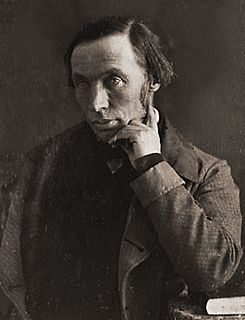A Quote by Viktor E. Frankl
Man's inner strength may raise him above his outward fate.
Related Quotes
A man may have lived all of his life in the gray, and the land and trees of him dark and somber. The events, the important ones, may have trooped by faceless and pale. And then-the glory-so that a cricket song sweetens his ears, the smell of the earth rises chanting to his nose, and dappling light under a tree blesses his eyes. Then a man pours outward, a torrent of him, and yet he is not diminished.
Ideas are powerful things, requiring not a studious contemplation but an action, even if it is only an inner action. Their acquisition obligates each man in some way to change his life, even if it is only his inner life. They demand to be stood for. They dictate where a man must concentrate his vision. They determine his moral and intellectual priorities. They provide him with allies and make him enemies. In short, ideas impose an interest in their ultimate fate which goes far beyond the realm of the merely reasonable.
A man unattached and without wife, if he have any genius at all, may raise himself above his original position, may mingle with the world of fashion, and hold himself on a level with the highest; this is less easy for him who is engaged; it seems as if marriage put the whole world in their proper rank.
For where there is true love, a man is neither out of measure lifted up by prosperity, nor cast down by mishap; whether you give or take away from him, so long as he keeps his beloved, he has a spring of inward peace. Thus, even though thy outward man grieve, or weep downright, that may well be borne, if only thy inner man remain at peace, perfectly content with the will of God.
Someone should keep reminding Mr. Average Man that he was born free, divine, strong; uncrushable by fate, society, or hell itself; and that he is a child of God, equal heir to all the bounties of God; and that goodness is riches, kindness is power, and freedom is glory. Above all, every man is born with an inner capacity to take him as far as his imagination can dream or envision-providing he is free to dream and envision.
The art of using troops is this:
......When ten to the enemy's one, surround him;
......When five times his strength, attack him;
......If double his strength, divide him;
......If equally matched you may engage him;
......If weaker numerically, be capable of withdrawing;
......And if in all respects unequal, be capable of eluding him,
..........for a small force is but booty for one more powerful.
The good devout man first makes inner preparation for the actions he has later to perform. His outward actions do not draw him into lust and vice; rather it is he who bends them into the shape of reason and right judgement. Who has a stiffer battle to fight than the man who is striving to conquer himself.
It is man's duty to live in conformity with the divine will, and this means, firstly, bringing his life into line with 'nature's laws', and secondly, resigning himself completely and uncomplainingly to whatever fate may send him. Only by living thus, and not setting too high a value on things which can at any moment be taken away from him, can he discover that true, unshakeable peace and contentment to which ambition, luxury and above all avarice are among the greatest obstacles.
[Speaking of his experience in a concentration camp:] As we said before, any attempt to restore a man's inner strength in the camp had first to succeed in showing him some future goal...Woe to him who saw no more sense in his life, no aim, no purpose, and therefore no point in carrying on. He was soon lost.
As a guy develops and practices his masculinity, he is accompanied by an invisible male chorus of all the other guys, who hiss orcheer as he attempts to approximate the masculine ideal, who push him to sacrifice more of his humanity for the sake of his masculinity, and who ridicule him when he holds back. The chorus is made up of all the guy's comrades and rivals, his buddies and bosses, his male ancestors and his male cultural heroes--and above all, his father, who may have been a real person in his life, or may have existed only as the myth of the man who got away.





































